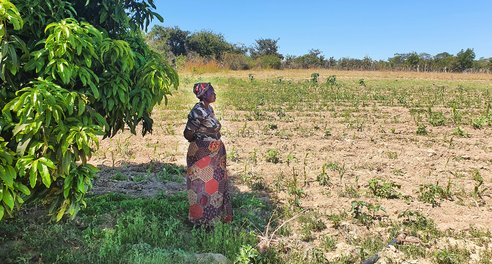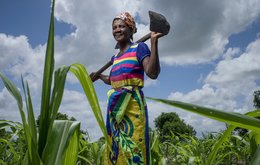BELÉM – Ministers arrive at COP30 after a first week in which negotiations moved at a crawl - especially on adaptation finance, where deep divisions remain and real grant-based support for the communities who need it most, particularly women and girls on the frontlines, is still missing. This slow pace stands in stark contrast to the scale of decisions Belém must deliver fit-for-purpose adaptation finance, a global shift away from fossil fuels, a credible Just Transition mechanism, and stronger implementation across the board.
CARE International urges ministers arriving in Belém to deliver a decisive course correction, grounded in fair, grant-based climate finance instead of loan-heavy pledges, stronger and fit for-purpose support for adaptation, a full fossil fuel phase-out, and a bold Gender Action Plan that advances gender equality in climate action.
Across key negotiating tracks, there are signs of momentum but also significant fragility. While efforts to craft a global roadmap to transition away from fossil fuels are gaining political traction, a credible phase-out is lagging as major gaps remain on ambition, clarity and timelines. The outsized presence of more than a thousand fossil fuel lobbyists is a stark reminder of the industry’s grip on the talks - despite COP28’s breakthrough Global Stocktake calling for a just and equitable transition away from fossil fuels to keep 1.5°C alive.
As week two begins, negotiators face a simple choice: move beyond signals and deliver - or risk leaving the world’s most vulnerable communities, particularly women and girls, waiting once again.
Amayaa Wijesinghe, Climate and Resilience Advisor, CARE International UK, said:
“The streets of Belém have been resounding with civil society, especially local communities and indigenous peoples, calling for increased ambition and a rights-based approach to climate justice.
"Drawing from this strong spirit of mutirão – joint effort – Parties need to come together in the spirit of multilateralism to prove that it is still possible for us to move beyond a narrow focus on domestic priorities, including squabbles over language on gender, to push towards consensus that benefits the most vulnerable communities globally, to secure our planetary future.”
Marlene Achoki, Global Climate Justice Policy and Advocacy Lead, CARE International, said:
“As COP politics accelerates into the week-2 political phase, developed countries must remember that ambition without quality finance is just a shiny number - and shiny numbers don’t irrigate fields, protect livelihoods, or feed women and girls. COP30 must deliver a real adaptation finance commitment: at least $120 billion a year by 2030. For adaptation finance to matter to frontline communities, it must be public, grant-based and accessible - not debt inducing or reliant on private finance.
"Before adopting the Global Goal on Adaptation, Parties must commit to robust finance and means of implementation to cover the growing adaptation gap, and ensure indicators are context-relevant and fit for purpose.”
Ram Das, Country Director, CARE Bangladesh, said:
“At COP30, our message is clear — this must be a people-centred COP. Climate finance must come, and as grants, not loans, and support must reach those on the frontlines of the crisis.
"In Bangladesh communities are restoring mangroves, regenerating farmlands, and leading the way toward resilience. We call on global leaders to turn promises into people-driven progress. Together, let’s make climate justice real.”
Kerime van Opijnen, Policy advisor on Gender Equality and Climate Justice, CARE Nederland, said:
“The renewal of the Gender Action Plan is essential to ensure climate action reflects the disproportionate impacts on women and directs adequate finance to them. Yet we are still seeing deliberate efforts to slow progress and even roll back agreed human rights language - and this is dangerous.
"Climate change is deepening inequalities, and urgent action requires the inclusion of all people. Any rollback on gender equality is, ultimately, a rollback on climate ambition.”
Chikondi Chabvuta, Southern Africa Policy Advisor, CARE Malawi, said:
“At COP30, we cannot afford another cycle of promises without delivery. Communities in Malawi and across Africa are already driving innovation for resilience, yet without fair, grant based finance and a renewed Gender Action Plan with clear financing, these efforts will remain underfunded and fragmented.
"Climate justice is not about numbers on paper - it’s about real resources reaching women and girls on the frontlines. That means putting them at the centre of adaptation and ensuring finance flows as accessible grants, not loans. Ministers in Belém must act decisively: move beyond rhetoric and deliver real resources for real solutions.”
Media enquiries
For media enquiries, please contact us on press.uk@careinternational.org


